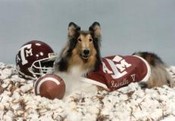
Reveille V (August 29, 1984 – June 25, 1999)[6] Reveille V was a descendant of a championship purebred American collie. She was chosen to be mascot from a pool of 2000 puppies because of her lineage and her marking. In December 1984, Reveille V was brought to the Texas A&M campus, and her first official appearance as mascot came at a basketball game on January 11, 1985. During her tenure, she attended every Texas A&M football game with one exception. During the 1987 corps trip, TCU officials refused to allow the Aggie mascot into the TCU stadium citing a regulation disallowing live mascots at home games. She attended many home basketball, baseball and volleyball games. A mischievous dog, Reveille V often stole erasers from chalkboards during class.[6]
In early November 1993, Reveille V underwent emergency surgery for gastric volvulus, which causes an animal's stomach to twist out of place. The surgery was successful, and she made a full recovery.[7] Later that month she relinquished her spot as mascot to Reveille VI.[8] For the next six years she lived with a local veterinarian and graduate of Texas A&M, Dr. Joe West. Reveille V was euthanized in June 1999 because she suffered from arthritis and a neurological disorder. Her funeral was delayed until September to enable students to attend.[8] Over 3,000 students and alumni attended the funeral,[9] which included Taps, a prayer from a campus chaplain, and eulogies from her former handlers. Reveille V was initially buried at Cain Park on the Texas A&M campus, but her grave was relocated to the north end of Kyle Field once stadium renovations were finished.[8]


John Motley (1983)
A&M's mascot recovering from emergency stomach surgery
Associated Press
TUE 11/02/1993 HOUSTON CHRONICLE
The 9-year-old collie became seriously ill and underwent surgery Sunday morning at A&M to put her stomach back in place.
Dr. Charles Hall, a veterinarian at A&M's Department of Small Animal Medicine and Surgery, said the 90-minute procedure went well.
"She should recover fully with no problems at all," Hall said.
Hall said the problem, called gastric dilation and volvulus, occurs when an animal's stomach twists or rotates out of place.
Deep-chested dogs, such as Irish setters, Great Danes and collies, are predisposed to the condition.
The condition sometimes occurs when predisposed dogs are active on full stomachs.
Hall said veterinarians don't know why it occurs, but it can be fatal if left untreated.
A member of A&M's Corps of Cadets who cares for the dog took Reveille to the university's small animal clinic.
Hall said Reveille will remain in the clinic's intensive care unit until Thursday, when the dog will be released if her recovery continues to progress normally.
Reveille already had been scheduled to retire at the end of the 1993 football season.
The dog is expected to be at A&M's Nov. 13 game against the University of Louisville.
At that time, Reveille VI will be introduced.